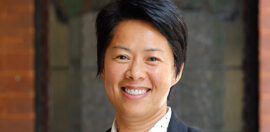A Lesson in Change
24 November 2014 at 11:29 am
As the Founder and CEO of Teach for Australia, Melodie Potts Rosevear knows the power of an effective teacher. Potts Rosevear is this week’s Changemaker.
Prior to her role with Teach For Australia, Potts Rosevear was a founding staff member of the Cape York Institute for Policy and Leadership in Queensland, focused on Indigenous and social policy. In her time as Think Tank Co-ordinator, Melodie helped to advance the Institute’s ambitious reform agenda through policy research, community engagement and helping to establish operational and business models.
 Teach For Australia’s vision is for an Australia where all children, regardless of background, attain an excellent education.
Teach For Australia’s vision is for an Australia where all children, regardless of background, attain an excellent education.
The organisation works towards this vision by recruiting highly competent individuals from diverse academic backgrounds and training and developing them to become exceptional teachers and inspirational leaders that meet the needs of schools in low socioeconomic communities and the broader education system.
Melodie Potts Rosevear has been involved with the program since its conception and wrote the original business plan for the organisation while completing her Master of Public Policy at the Harvard Kennedy School.
What are you currently working on in your organisation?
Teach for Australia is an education charity focused on addressing educational disadvantage. The premise of TFA is simple: recruit, train and enable top graduates from disciplines (such as engineering, commerce and law) to teach in disadvantaged schools and actively develop them into exceptional teachers and future education leaders. Six years on, we have:
Expanded the program from Victoria to the Australian Capital Territory, the Northern Territory and Western Australia with additional states expressing interest.
Received almost 5,000 program applications to date, admitting less than 10 per cent to join as “Associates”.
Ensured that 94 per cent of Associates complete the program.
Placed almost 300 Associates in over 60 disadvantaged schools, who have in turn taught over 35,000 disadvantaged students with amazing results.
Seen the majority of Alumni go on to stay in teaching, taking on positions of responsibility, and other Alumni involved in education policy development and educational entrepreneurship.
Our main objective right now is growth – increasing the program size to serve more students across more schools in more states. Relatedly, we are growing our funding base by expanding our efforts in attracting philanthropy, now that we have secured DGR status. We are privileged to already be receiving support from foundations and individuals but know that there is much more to do to increase investment in educational equity.
What drew you to the Not for Profit sector?
I was the first person in my extended family to attend university and I emerged with an opportunity for social mobility. Immediately, I started working at Boston Consulting Group and was fortunate to be charged with a combination of public and private client projects. I valued both but was really drawn to the nexus between the two – where Not for Profit organisations exist and complement the work of government and business, tackling problems that neither have yet resolved.
How long have you been working in the Not for Profit sector?
I have been working the Not for Profit sector for over ten years.
What was your first job in the Not for Profit sector?
I started working in the Not for Profit sector on moving to Australia as a founding staff member and Think Tank Coordinator of the Cape York Institute for Policy and Leadership. It was based in Cairns and involved working closely with the prominent Indigenous leader, Noel Pearson. Later, struck by the need and opportunity that I saw while working in the Cape, I decided to found Teach For Australia to help improve the education system and outcomes for disadvantaged young people.
What is the most rewarding part of your work?
The most rewarding part of my work is visiting partner schools and seeing students (those, who many would suggest could not learn or excel at a high level) engaged, learning and feeling really valued by their teachers. I also enjoy seeing teachers that we recruit, train, and support go from being committed to convicted, resolute in their work and working side-by-side with other teachers and principals to improve the life chances of kids.
What has been the most challenging part of your work? And how do you overcome that?
The most challenging part of my work is the inevitable question, what more could we be doing to have impact? In order to address educational disadvantage, we need to be bigger and better, we need to create more partnerships with more schools, more like-minded organisations and more governments. At the same time, we also need to maintain a balance between constantly striving towards improvement and acknowledging the success that we have achieved. I am a bit of a perfectionist so finding that balance can be hard sometimes! I do try to pause every so often and celebrate, encouraging the team around me to do the same and remind each other to do so!
In terms of your work sitting on a Not for Profit board, what would you say is the key to an effective NFP board?
I think the key to an effective Not for Profit board is communication and trust. This enables transparency and allows everyone to be vision aligned, while also having the ability to engage in frank and robust conversations about the organisation’s strategy, risks, opportunities and operations.
What do you like best about working in your current organisation?
What I like best about working at Teach For Australia is the diversity of the people, who have a shared commitment to improving educational outcomes for disadvantaged students. From partner school principals, teachers and students to government, corporate and philanthropic supporters, staff, Associates and Alumni – the level of diversity makes for a very flexible and dynamic organisation. Staff engagement results indicate a love of this diversity and of their work at Teach For Australia.
I consider my greatest achievement to be …
Aside from my family, I consider my greatest achievement to be founding Teach For Australia in 2008, at the age of 29, with a mission to address educational disadvantage and navigating the organisation through the often tumultuous start-up years!
Favourite saying …
Given that I am originally from the South in the US, my staff would tell you that “ya’ll” or “folks” is possibly my most frequent expression. My personal favourite saying, however, is a paraphrasing of Nobel Prize winning economist Amartya Sen’s discussion on the objective of economic development, being freedom. I have appropriated it as the objective of an education: that is, an excellent education is one that ensures young people have “the capability to choose a life they have reason to value”. The longer you sit and reflect on that, the deeper the meaning gets – at least, for me anyway!
I’m always being asked …
Where is your accent from? I have been in Australia for over ten years and I guess that I now have a wild mixture of intonations! My reply is, “I have a Southern accent with an Australian drawl.”
What are you reading/watching/listening to at the moment? Why?
Between being a CEO, partner and mother of a two year old, I am currently using my “spare time” to upcycle furniture. I have been a bit addicted this past month to YouTube videos about how to use Annie Sloan Chalk Paint as I attempt to repurpose furniture. That stuff is amazing and time saving!
Through your work, what is your ultimate dream?
My ultimate dream is of an Australia, where all children, regardless of background, attain an excellent education – that we will break the link between socioeconomic status and level of educational attainment and life chances. I have seen a lot of education systems around the world and I really believe that, in Australia, we have the capabilities and resources at hand to make educational equity a reality, if we are willing to put students first and have honest conversations about what is and is not working. I have a deep sense of possibility that we can eradicate educational disadvantage here – it will not be easy but it is possible and within our lifetime.
My greatest challenge is …
Continuing to adapt as the organisation grows and adapts. Leadership is after all an adaptive challenge!
School taught me …
School taught me the transformational power that a teacher can have. Mr Mackey and Ms Gary were two teachers who made a dramatic impact on my own confidence and abilities. They were not necessarily the most popular teachers but in hindsight I think that they were two of the most committed teachers that I have ever met – and in very different ways.
What does a typical day for you involve?
As the alarm (that is my two year old) goes off, I (despite all advice) immediately check my emails and news alerts and orient myself again to the day’s calendar. After the usual morning rush any working mother would recognise, including child care arrangements, I jump on the tram or drive into the city (depending on my evening commitments). Once in the office, I check in with my assistant, process diary requests and ensure any appropriate pre-work is in the pipeline. Each day, I meet with at least one member of the senior leadership team to discuss strategy and operations and also have meetings with other staff as appropriate. Lunch or coffee is either had with an external stakeholder, whether education affiliated, corporate or philanthropic supporter or government representative – if not, it is sushi al desko. In the afternoon, I spend time in either external meetings or working through research, policies and reports related to the work of Teach For Australia before racing off to pick up the two year old. My husband is the master chef, so, I am generally on play, bath and bed duty before we unwind and unpack each other’s day over dinner and the latest cooking show or political news.
What (or who) inspires you?
I am inspired by one of my friends, who is a personal example of the impact that Teach For Australia Associates will have over the next ten years. This friend turned down a lucrative job with a top tier professional services company to join Teach For America, teaching in a very difficult urban setting. After teaching for just three years, at the age of 25, he established a new public school to which students from the most disadvantaged schools in the state were referred and, quite remarkably, within four years, took them from being considered a “lost cause” to being ranked fourth in the state for educational outcomes. Now 36 years old, my friend is second in charge of one of the biggest and most disadvantaged school systems in the United States. I look forward to seeing Teach For Australia Alumni in similar positions of influence soon, driving change for kids in need.
Where do you feel your passion for good came from?
My father was a small business owner and entrepreneur and my mother had a lifelong career working in social services (the equivalent of Centrelink) in the US. They both had a passion for pursuing new ideas and working in ways that made a difference to others – and they instilled in me those values. Now that I am a parent, I see how formative that was for me and am very grateful to them.







